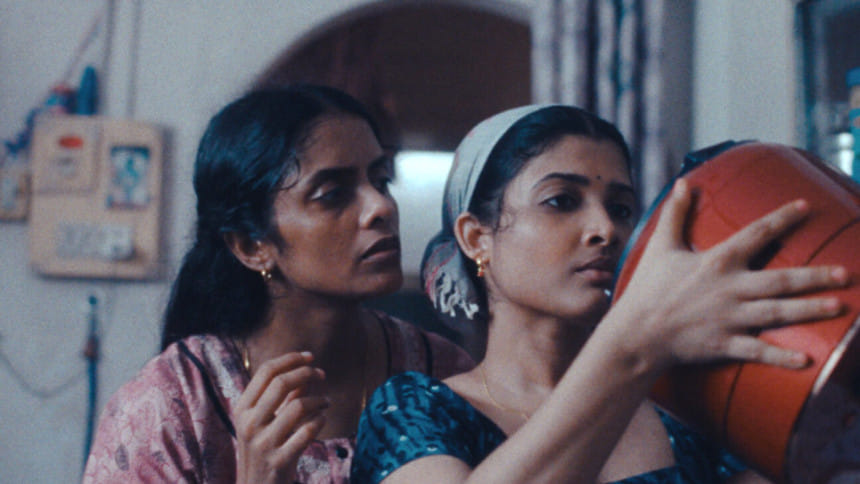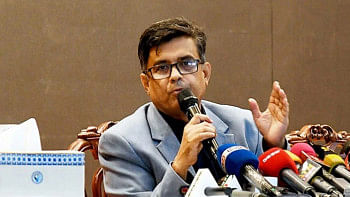All We Imagine as Light carves out tenderness in the harshest of spaces

All We Imagine as Light follows the story of Prabha and Anu, roommates who also work at the same hospital. While the two quite literally share the same space, both at a personal and professional capacity, the plights plaguing each character are vastly different. The source of both their pains, however, emerges from a sense of longing, which their circumstances are unwilling to accommodate.
Nurse Prabha is thrown into a daze after receiving an unexpected present (a rice cooker), presumably from her husband, whom she has not spoken to in over a year. The present serves as a stark reminder of not only her husband's absence but also of her longing for companionship or merely to be seen. This desire, as human as it may be, is intensified in a city like Mumbai where every inch of it is laced with promises of progress and profit. Against the backdrop of this relentless setting, Prabha must reckon with and repress her desires.
In contrast, Anu wishes nothing more than to seek a safe space, away from the prying eyes of the city, to spend some time with her partner, Shiaz. Even amidst on-going speculations at her workplace about her budding romance, she pursues it, albeit with a degree of vigilance, preventing the young couple from letting their guard down. After all, the consequences of anyone catching wind of their illicit relationship would be fatal due to their religious identities.
Despite the obvious contrasts between Prabha and Anu, they are both in a state of delirium. While Prabha is devastated about the prospect of a failed marriage and no closure, Anu is in a heightened sense of euphoria which she is forced to contain.
It is through their differences that Payal Kapadia, the director and writer of the film, underscores the impact of the city on its inhabitants. In dense places with compact spaces, we may be ripped apart and left all alone, or fortunate enough to find someone in the nooks and crannies that we've been pushed into. This sentiment is echoed through Parvaty, who also works at the same hospital as Anu and Prabha. She is forced out of the house she has lived in for decades as the plot has been occupied by a real estate developer. Owing to her lack of documentation, she – along with her neighbours — is driven out to accommodate the development of an urban renewal project.
The first hour of the movie is set in Mumbai, with each character's delirious state of mind portrayed through a hazy, soft, and almost dreamlike look. Most of the movie looks luminous, giving the visuals a visceral feel. Similarly, the scenes that require a little more subtlety are treated with the same care, dialling down the intensity while maintaining the same luminous look. This quality also extends to the sound design and soundtrack. The two work together in harmony to capture the essence of the film's settings. Initially, the ambient piano motif is juxtaposed with Mumbai's blaring soundscape. In the second half, it amplifies the calm as the setting shifts to Parvaty's village.
Such prowess is not only merely limited to the technicalities. In fact, I thought that the writing was the film's strongest quality. Payal Kapadia hints at the love the characters have for each other, choreographing scenes that unite them in small moments of respite, only to then snatch it away. At no point does she rush the pacing, taking her time to flesh out each character in great detail without being overbearing.
She also brilliantly portrays a vast spectrum of femininity. Nurse Prabha, for instance, isn't limited to just being a nurturing woman. We see her in moments of vulnerability as well as strength. These instances don't emerge in spite of her being a nurturing woman but because of it. Parvaty, the supporting character, almost serves as a bridge between the two main characters. She possesses the wisdom that Prabha has and also appears to be free-spirited, much like Anu. As for Anu herself, we see a fierce character who finds brief moments of quiet, heartbreak, and vindication. For her seemingly boisterous nature, she is unapologetically able to communicate her affection for the people around her.
This movie undoubtedly deserves all the critical acclaim that it has received. Payal Kapadia has crafted a refined film, complete with technical mastery, controlled storytelling, and a lot of heart. All We Imagine as Light perfectly encapsulates the essence of a city like Mumbai, where even amidst cramped spaces, we manage to steal glances, long for familiarity, and curse the selfish desires of its inhabitants. While the prospect of leaving it all behind is a bittersweet experience, we don't quite realise how much of its illusion we internalise.

 For all latest news, follow The Daily Star's Google News channel.
For all latest news, follow The Daily Star's Google News channel. 



Comments